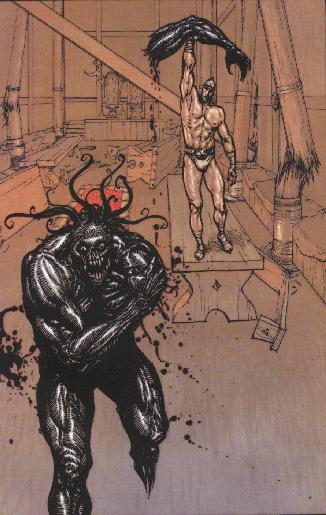


BEOWULF"A protector of his people, pledged to uphold truth and justice and to respect tradition, is entitled to affirm that this man was born to distinction." Beowulf is the great Geat warrior from the line of Hrethrel. He is a son of Ecgtheow. In our passage, he serves as thane to both the Danish lord and king, Hrothgar, as well as to the Geat lord and king, Hygelac. Beowulf exemplifies all that is valued in a warrior of his time. He is strong and fearless in battle, yet he is not quick to boast. He is a loyal thane to both of his "ring-givers." As he departs Denmark, he says to Hrothgar: |
|
If there is any favor on earth I can perform beyond deeds of arms I have done already, anything that would merit your affections more, I shall act, my lord, with alacrity.(Norton 1821) |
He is willing to face death in order to make good on his pledges, and, with this, he gains the respect and admiration of all with whom he comes in contact with. The author shows this in a reference to the "coast-guard" who interrogates Beowulf upon his arrival in Denmark saying:
|
His salute this time from the top of the cliff was far from unmannerly; he galloped to meet them and as they took ship in their shining gear, he said how welcome they would be in Geatland.(Norton 1892) |
Beowulf later becomes the king of the Geats.
GRENDEL"And from Cain there sprang misbegotten spirits, among them Grendel, the banished and accursed" Grendel is the flesh-eating "fiend out of hell"(Norton 100) who haunts Heorot, the mead-hall, for 12 winters. He comes "in off the moors" after dark to feed on the flesh of the drunken warriors who pledge, each night, to defeat him. He is said to be a descendant of Cain, the first "brother slayer" recorded in Christian history. He is not the only one of his kind. His mother, who remains nameless throughout the story, comes to avenge his death. |

|
Grendel is, by no means, an insignificant threat to the warriors. He is described as having an "awesome grasp"(Norton 835), and is portrayed as being very strong. This is suggested by the author's description of his entrance to Heorot:
|
The iron-braced door turned on its hinge when his [Grendel's] hands touched it. Then his rage boiled over, he ripped open the mouth of the building (Norton 721) |
"Her onslaught was less only by as much as an amazon warrior's strength is less than an armed man's when the hefted sword, its hammered edge and gleaming blade slathered in blood, razes the sturdy boar-ridge off a helmet."(Norton 1282)
Grendel's mother is the "monstrous hell-bride" (Norton 1259) who comes to Heorot to avenge the death of her son, Grendel. Likened to an amazon warrior, she is no less of a threat to the Danes than Grendel himself. Interestingly enough, Grendel's mother acts more like a warrior than a monster in that she only kills one warrior in an act of retribution, as is the warrior code. Grendel, on the other hand, preys on the Danes with an intent that is described as being "malignant by nature." Grendel's nightly murderous and canabalistic actions stem from pure evil.
"A pariah king who cut himself off from his own kind, even though Almighty God had made him eminent and powerful and marked him from the start for a happy life"(Norton 1714).
Heremod is a prior Danish king who turns evil. He is referred to by Hrothgar during his warnings to Beowulf about the trap of hubris. Apparently, Heremod starts out as a good king but lets his pride and greed take over. This leads to his wicked deeds towards his people, and to his unhappiness in the end. As Hrothgar puts it:
|
He vented his rage on men he caroused with, killed his own comrades...He suffered in the end for having plagued his people for so long: his lofe lost happiness.(Norton 1713) |
"Friends and kinsmen flocked to his ranks, young followers, a force that grew to be a mighty army"(Norton 65).
Hrothgar is the lord and king of the Danes. He is a descendant of Shield -- son of Halfdane. Hrothgar is a very respected king and a loyal companion. In his younger days, he was a great warrior. His power as a warrior is emphasized in his speech to Beowulf when he says:
|
Just so I ruled the Ring-Danes' country for fifty years, defended them in wartime with spear and sword against constant assaults by many tribes: I came to believe my enemies had faded from the face of the earth.(Norton 1769) |
Since those days, he has become old and unhappy due to the fact that he has been unable to exact a "death-price" for the deaths of many of his thanes.
Hrothgar, as the "ring-giver," upholds the comitatus formed between himself and his thanes. He very generously rewards those who serve him, as seen by the many treasures showered upon Beowulf during his time of service. He is also seen as being very wise. In fact, Beowulf refers to him as the "wisest of kings."(Norton 1474)